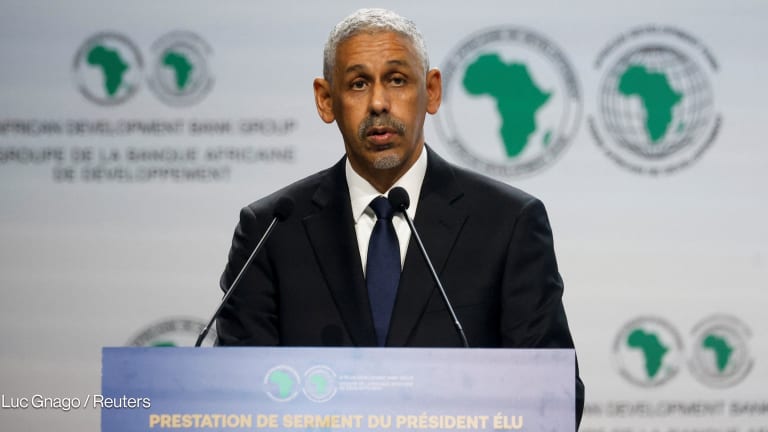
Australian Foreign Minister Julie Bishop’s announcement of performance benchmarks and more private sector participation in foreign aid programs was generally well received on Wednesday by the country’s development community, although some NGOs said they need more specifics.
Bishop’s “new aid paradigm” also laid out priority sectors for Australian official development assistance projects and finally offered some clarity on how the aid budget will be spent — which came as a “relief” for organizations like the Australian Council for International Development, whose Executive Director Mark Purcell welcomed the release of a “clear framework for how Australia’s AU$5 billion aid program will operate.”
READ: Australia’s ‘new aid paradigm’ introduces performance benchmarks
However, the changes will be rendered ineffective if the poorest people are not the biggest beneficiaries, other aid groups warned.
Oxfam Australia chief Helen Szoke said the framework can only be “positive if implemented with [the] poor people at its heart" to ensure that economic growth benefited those in need, rather than widening the gap between the rich and poor.
While the performance benchmarks may not entirely be a new thing, as accountability and efficiency mechanisms are expected to be present in an institution like the Australian government, Mat Tinkler, policy and public affairs director at Save the Children Australia, told Devex that Bishop’s reforms could serve as a good precedent for the future of the country’s aid program.
The real question, nevertheless, is the ability of the government to actually implement these benchmarks effectively and efficiently.
“Benchmarks to measure performance and focus on results are welcomed, but we would point out that many of these result systems already exist in DFAT yet the ability of government to interpret and use them to adjust program and funding allocations has not been that evident in the past,” Plan Australia CEO Ian Wishart told Devex.
Private sector focus
The strengthened emphasis on private sector participation — alongside human development as top-level priority — was also welcomed by local and international NGOs, but they cautioned these new players to be mindful that, in development, people always come before profit.
Szoke noted that while development requires an “all hands on deck” approach, Australia will need to “put in place strong checks and balances to ensure engagement with the profit-driven sector works to reduce poverty and does not further entrench inequality.”
Private sector participation in planning, designing and delivering development outcomes has been gaining traction the past few years, especially in Asia-Pacific. More countries are reaching middle-income status, and the region is awash with capital given the increase in investments and the relatively positive economic outlook in the coming years.
The push for private sector participation is rooted at the Abbott government’s intention to characterize its development assistance through an aid-for-trade approach. Bishop noted that Australia’s aid program will now be branded as an “economic partnership” and not the rustic “donor–beneficiary” perspective, but Wishart clarified that the “aid-for-trade” approach, with the private sector at the center, may roll out a lot of “ifs” in the process.
“If it is private sector growth for the elites that we have to wait to see if it trickles down to the bottom 20 percent, then we won’t be impressed,” he said. “If it is innovative, flexible and embracing of the efforts of the poor, it could stimulate positive economic growth.”
Tim O’Connor, UNICEF Australia communications head, chimed in saying that the kind of “partnership” should be genuine because at the end of the day “economic growth is crucial to tackling poverty but ... aid is [only] at its most effective when it is targeting the hardest to reach.”
Priority sectors
Of the six priority sectors, most NGOs highlighted the renewed focus on gender issues and women’s empowerment, which CARE Australia chief Julia Newton-Howes called an “important step [toward] addressing the injustice of gender inequality in the region.”
As for the provision mandating 80 percent of all development investments — regardless of objectives — to focus on gender issues during implementation of the development project, O’Connor said the government may have to double its efforts and be up on its toes as this commitment may be a little too “ambitious.”
While the priority sectors are comprehensive, some NGOs would have liked even more to have been included in the new aid paradigm. For instance, Szoke expressed her disappointment that climate change is not a priority of the Australian government — not surprising given Abbott’s stand on the issue — despite the focus on humanitarian assistance.
“The most savage impact of climate change is increased hunger and poverty,” she said in a statement.
Wishart, meanwhile, pointed out the fact that the decrease in development assistance in Africa is “short-sighted.”
Asked about the possible effects of the new aid paradigm to their operations, NGOs admitted they need more details about the changes in the country’s aid budget and policy.
O’Connor said there “remains a lot of substance and details to come,” while Wishart noted that “the devil will be in the details here.”
Read more development aid news online, and subscribe to The Development Newswire to receive top international development headlines from the world’s leading donors, news sources and opinion leaders — emailed to you FREE every business day.








